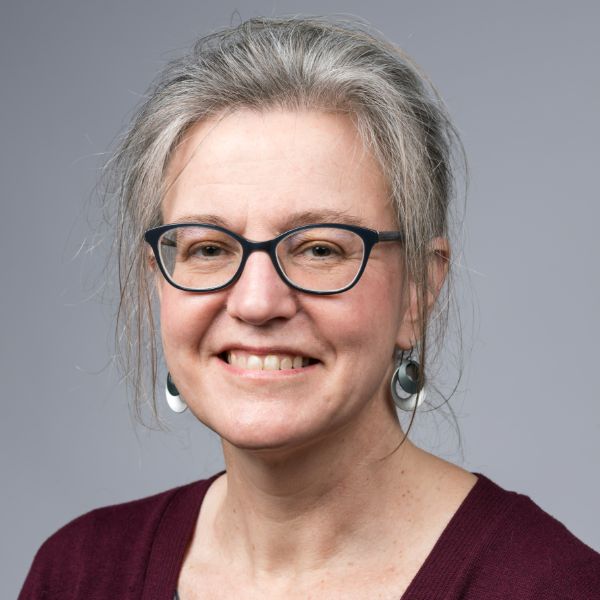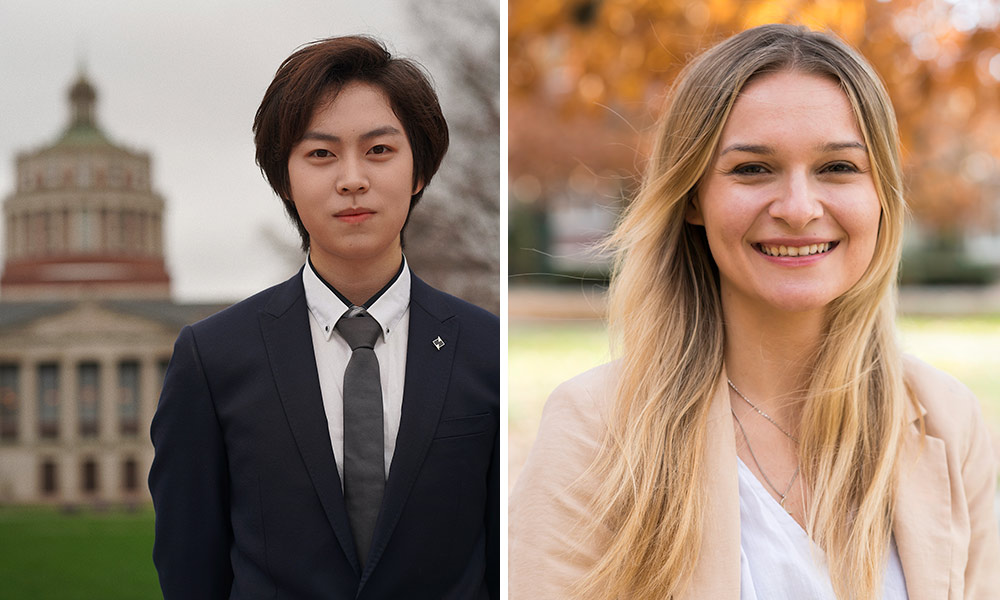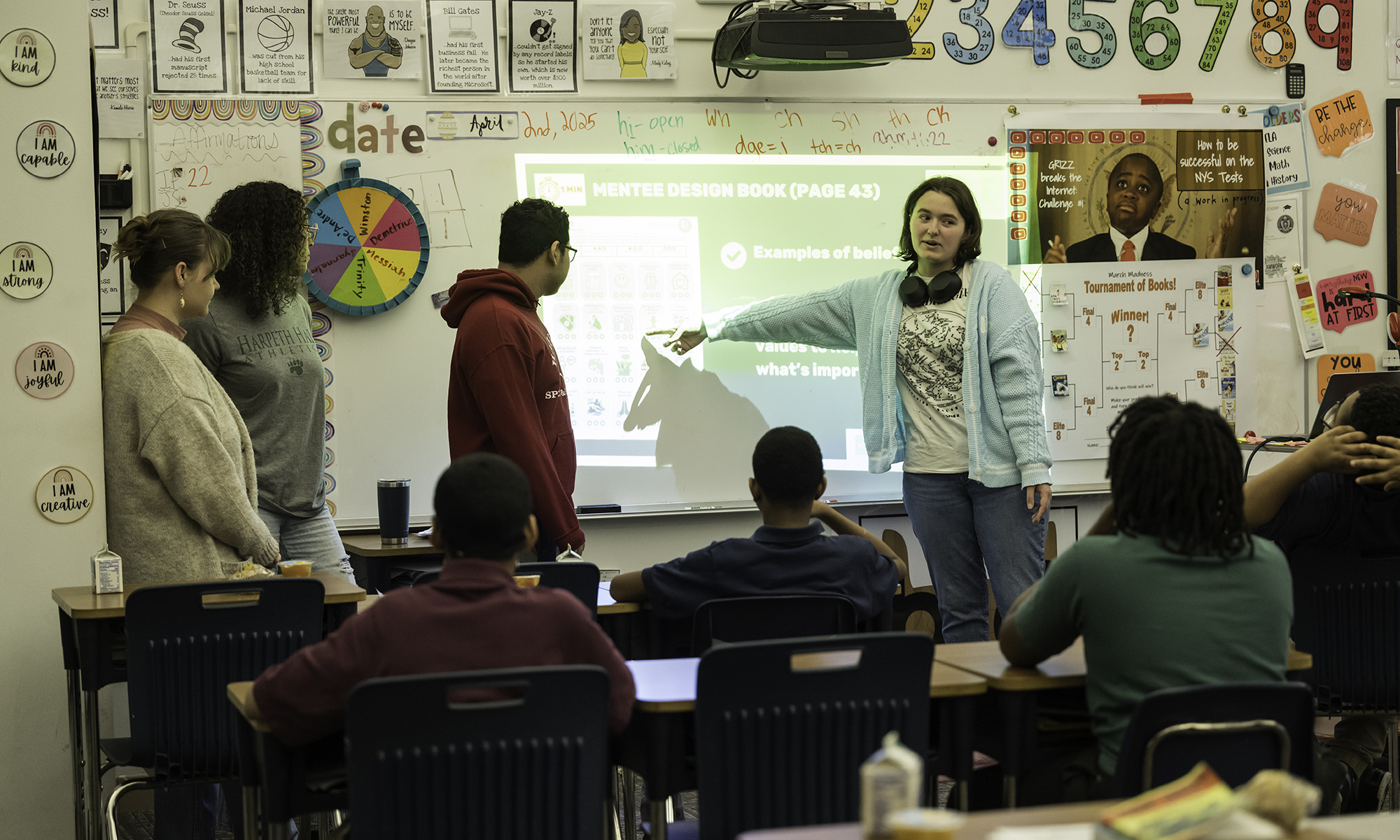The highly competitive program prepares leaders for a 21st-century global landscape in which China plays a pivotal role.
Lea Thome ’22, an international relations and political science double major in the College, and Haosong Zheng ’21, a master’s degree candidate in business analytics at the Simon Business School, are among 151 students and young leaders worldwide who have been chosen as 2022–23 Schwarzman Scholars.
Nearly 3,000 applicants competed for admission into the prestigious program, now in its seventh year. Established by investor and philanthropist Stephen Schwarzman, the program prepares future leaders by offering an immersive experience in China within an international community of thinkers and leaders in business, politics, and society. Schwarzman Scholars pursue master’s degrees in global affairs (in English), study Chinese language, and have access to internships, personalized mentorship, high-profile speakers, field-based seminars, and travel to different regions of China.
Four Rochester students and recent alumni have previously been selected for the scholarship: Beauclaire Mbanya ’20 and Suman Kumar ’19 (2020–21), Beixi Li ’19M (MPH) (2019–20), and Jintian (Jay) Li ’12 (2016–17).
Says Belinda Redden, director of the fellowships office in Arts, Sciences & Engineering: “I hope that having two Rochester students from opposite sides of the globe selected again for the Schwarzman Scholars Program will inspire even more of them to consider this unparalleled opportunity for high-impact academic and experiential learning in a country that is critical to a more peaceful, interconnected world.”
Redden, who advises applicants to competitive scholarship and fellowships programs, adds, “We need ambitious, optimistic young people like Thome and Zheng to engage in this essential work of intercultural understanding, no matter how they ultimately choose to use their talents.”
Lea Thome ’22
Thome is from Duisburg, Germany, a sister city to Wuhan, China. Growing up in a politically engaged household, she developed an early and keen interest in current affairs watching and discussing news and political events with her father. While a student at the LEAF Academy—a high school in Bratislava, Slovakia, designed to prepare Central Europe’s future leaders—Thome interned at the Slovak Parliament, participated in Model European Parliament Slovakia, and went on a three-month cultural exchange program in Wuhan.
At Rochester, she became president of the International Students’ Association. Then, on July 6, 2020, when the Department of Homeland Security announced that international students on M-1 or F-1 visas would not be permitted to take a full online course load and remain in the US, Thome—who will soon be the first in her family to earn a college degree—founded an advocacy website, International Student Action and initiated a Change.org petition that received more than 400,000 signatures. Thome’s online activism was part of an extensive backlash in the higher education community that ended with the rescinding of the federal directive.
In October 2020, Thome led Rochester’s three-student team at the 2020 Schuman Challenge, a program of the European Union Delegation to the US. Twenty-nine American college and university teams competed in addressing the question, “How should the EU and the US respond to China’s alternative models of governance?” The team, which received an honorable mention, “focused on the utilization of advanced technologies, like Smart City technology being developed by companies like Huawei, to spread alternative models of governance,” Thome explains.
Her initial interest in technology and international relations came about when she attended parts of the 2019 Comprehensive Nuclear-Test-Ban Treaty Organization (CTBTO) Science and Technology Summit in Vienna, Austria. Then, she says, “after participating in the Schuman Challenge, I was inspired to explore the study of other advanced technologies, like artificial intelligence, facial recognition, cyberwarfare and smart city technology. I have been exploring this interest most recently through coursework and independent research on China’s rise in modern international relations under Professor [Hein] Goemans.”
Recalling her first experience studying abroad, in Wuhan, Thome says: “My hometown sent me to study Chinese language and culture for a semester in our partner city among other selected international students. I am incredibly excited to be returning back to the country which inspired me to continue seeking out education abroad.”
Haosong Zheng ’21, ’22S (MS)
Zheng is from Beijing, China. While he was an undergraduate with a dual major in business and data science, he established himself as a leader in cultural exchange, the arts, and finance.
Toward the end of his first semester at Rochester, Zheng became president of the University’s Chinese Students and Scholars Association. During his four years as president—a position he still maintains—he not only did the usual work of organizing student events, but also conducted conferences in Beijing, Shanghai, and Chongqing to help strengthen the University’s Chinese alumni network.
He brought that same dynamic leadership to the Chinese Drama Club, where, as director of the 40-person organization, he grew audiences while simultaneously directing and performing in multiple club productions.
Since the end of his first year at Rochester, Zheng has spent his summers working in Beijing in multiple roles in finance, including for the Ministry of Finance, China Galaxy Securities, and the China International Capital Corporation.
Rochester is not Zheng’s first experience with study abroad; he earned an international baccalaureate degree from TASIS, the American School in Switzerland, which draws students from around the globe. There he developed what he describes as his long-standing interest in “trying to connect people . . . and provide the opportunity for people to know and learn from each other.
“I noticed many Chinese students were not adapting to the new environment and local culture very well,” he says. In response, he joined student council and served as cultural ambassador, planning events designed to be fun, welcoming, and educational, for students to learn more about each other, the new academic environment, and the local culture.
Zheng says the Schwarzman Scholars program will be “a valuable opportunity for me to understand more about China from new perspectives” as well as, he anticipates, an opportunity for scholars from other nations to develop a “nuanced” understanding of China to replace cultural misunderstandings he says have accompanied the nation’s rapid arrival as a major world power and that “undermine our connections both as global citizens and human beings.”
“Nations can cooperate and leverage their own competencies to help the development of other nations,” he says.




